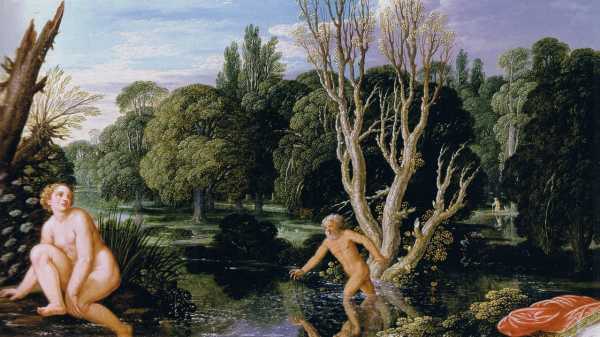
Lately, the only enjoyable Twitter accounts are the ones that are timely entirely by chance. One of these accounts is @MagicRealismBot, which auto-generates odd, evocative plot summaries: “One hundred metaphysicians imagine an exclamation mark into existence,” or “An arrogant supermodel falls in love with the Vietnam War.” Recently, it tweeted, “A girl turns into a lake. She is secretly pleased.” This missive got many more likes than the bot’s tweets normally do. Possibly, a lot of us would be pleased, at the moment, to spontaneously turn into a lake. In the past month, Brett Kavanaugh was confirmed to the Supreme Court; a United Nations climate report predicted widespread environmental disaster by 2040; the Trump Administration sought to alter civil-rights law in a way that would prevent the legal recognition of trans and intersex people; many conservatives became consumed with racist paranoia over a caravan of desperate people marching north in legal pursuit of asylum; eleven devout Jews were murdered in their synagogue; and the President declared his hope to end birthright citizenship by executive order. These days of fear and sadness show no sign of abating. It’s been a long time since I’ve felt lake-like—cool and still.
Just as a person does not wish to become a motionless body of water for no reason, girls don’t get to turn into lakes on a whim. I’ve been rereading Ovid lately—the clean and gorgeous Rolfe Humphries translation of the Metamorphoses, published in 1955—and, in Book V, the nymph Arethusa tells Ceres the story of how she was transformed into a spring. Out hunting alone on a hot day, she found a silent, clear river with silver willows on the banks. She took off her clothes and went swimming, only to hear a “curious kind of murmur / From deep down under”—the river god Alpheus. In “that hoarse voice he had,” Arethusa says, Alpheus asked her, “Where are you going in such a hurry, Arethusa?” She began running away from him, “naked, for my clothes / Were on the other bank, and all the more / He kept on coming; naked, so he thought / I was readier for the taking. So I fled.” She kept running, through fields and mountains and “pathless places,” with the sun at her back and Alpheus’ shadow looming over her shoulder, frightened at “the way his labored breathing / Blew on the back of my hair.”
As Alpheus caught up to her, Arethusa prayed to Diana. “Cold sweat / Poured over my limbs,” she tells Ceres, and then, suddenly, “wherever I moved / There seemed to be a pool.” She became a deep spring, plunging beneath the earth. “But even so, he knew me,” she says. “He laid aside his human shape, became / A river again, a watery shape, to join me.” In college, when I read this passage for the first time, I underlined those lines. I found them so beautiful. Yes, Alpheus turns himself into a river so that the woman he tried to rape could never get rid of him. But, at nineteen, I believed what I had read about the end of history. I thought that, in my lifetime, power would move toward freedom, away from cruelty. To me, a story of conquest could still sound like a story of love.
“Rape is a metaphor of our times,” a book review from 1975 began. That was when Mary Ellen Gale considered Susan Brownmiller’s landmark book “Against Our Will” for the Times. “Men rape the land and ravage the oceans,” Gale went on. “They even penetrate the skies. And, as a sort of environmental afterthought, they rape women. That is how many of us who lay uncertain claim to the tarnished titles of liberal or intellectual have thought about rape, if we think about it at all.” Gale argued that Brownmiller, in her book, had proved that idea wrong: in truth, the “rape of women comes first.”
In “Against Our Will,” Brownmiller laid out a lesson that has become widely accepted only as its proof has become emotionally unbearable—that a politics of dominance over the earth, the poor, the vulnerable, is fundamentally connected to the belief that women’s bodies are rightfully subject to men. “As man conquers the world, so too he conquers the female,” Brownmiller wrote. “Down through the ages, imperial conquest, exploits of valor and expressions of love have gone hand in hand with violence to women in thought and deed.” Rape, she argued, was often presented as a heroic act, its depiction rooted in the traditions of mythology, where every god and hero seemed to be out to conquer a woman, and the ultimate result was beauty—deep water, four seasons—rather than pain.
It is easy to be seduced, or overpowered, by whatever is presented as inevitable. I went back to Ovid because, in the wake of Kavanaugh’s confirmation, I kept thinking about Apollo and Daphne. I could feel a sadness hardening inside me—a shameful, increasing desire to stop running, to find some way to be impassive and serene. When I reread the so-called love story, I was startled by the acuteness of the Humphries translation: the way that Apollo, growing more eager for Daphne, notes her long hair, “uncared for,” and says, “But what if it were combed?” And how, when she runs away, he cries out that he is not the enemy, and moves from grandiosity to pleading to insult in sixteen lines:
The lamb flees from the wolf, the deer the lion,
The dove, on trembling wing, flees from the eagle.
All creatures flee their foes. But I, who follow,
Am not a foe at all. Love makes me follow,
Unhappy fellow that I am, and fearful
You may fall down, perhaps, or have the briars
Make scratches on those lovely legs, unworthy
To be hurt so, and I would be the reason.
The ground is rough here. Run a little slower,
And I will run, I promise, a little slower.
Or wait a minute: be a little curious
Just who it is you charm. I am no shepherd,
No mountain-dweller, I am not a ploughboy,
Uncouth and stinking of cattle. You foolish girl,
You don’t know who it is you run away from,
That must be why you run.
Daphne, as she runs, becomes more beautiful, “her garments fluttering, and her soft hair streaming.” The god and the nymph run, “one swift in hope / The other in terror, but he ran more swiftly.” She finally cries out, “O help me / If there is any power in the rivers / Change and destroy the body which has given too much delight!”
This line—this plea for self-destruction—crushed me. I looked it up in Brookes More’s translation, from 1922: “Destroy the beauty that has injured me,” Daphne cries, in that rendition, “or change the body that has destroyed my life.” In the 1717 version, which was compiled, with the help of several translators, by Samuel Garth, she calls out, “Gape earth, and this unhappy wretch intomb; or change my form, whence all my sorrows come.” This plea is an expression of unimaginable resistance and capitulation at once. It is as moving as the seventeenth-century sculpture by Bernini that freezes Apollo and Daphne in a sweeping, unstable conversion between lust and fear, and it is as brutal as Kiki Smith’s more recent sculpture, in which Daphne is mutilated, headless, with strips of jagged glass where her face and hands and feet used to be. In the myth, after Daphne becomes a laurel tree, Apollo, as Humphries has it, “kissed the wood / And the wood shrank from his kisses.” But then: “The laurel / Stirring, seemed to consent, to be saying Yes.”
The Shiva Gallery at John Jay College is currently home to an exhibition called “The Un-Heroic Act: Representations of Rape in Women’s Art in the U.S.,” in which the male depiction of rape as a triumphant act of conquest is wholly absent. Instead, the twenty artists in the exhibit—including Jenny Holzer, Ana Mendieta, and Kara Walker—depict the aftermath of rape. In a video by Naima Ramos-Chapman, the artist, numb and skittish, attempts to navigate a bureaucratic helpline. In a photograph by Jennifer Karady, an Iraq veteran lies on her bed, in uniform, caught in an endless dream. A piece called “Guarded Secrets,” by Sonya Kelliher-Combs, is a menacing, vulnerable collection of paper-thin membranes studded with porcupine quills. What we do to ourselves in order to weather trauma often feels similarly abstract, silent: a patch of skin becoming barklike, a former softness growing spikes.
On the day I went to “The Un-Heroic Act,” which is on view until November 3rd, it was cold outside, and I stayed for a long time. I tried to stop thinking about changing myself to better meet our era; I tried to remember that I’ve already been changed. Trump had just reasserted his praise for Greg Gianforte, the Republican congressman from Montana who assaulted a reporter. Saudi Arabia had just confirmed the death of Jamal Khashoggi. Other people walked around the room, radiating grief and exhaustion. For a moment, I imagined us all turning into trees, and then turning back.
Sourse: newyorker.com






